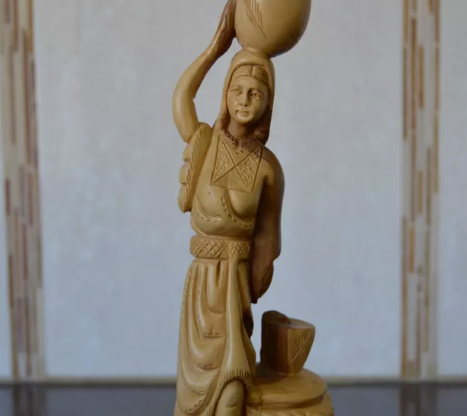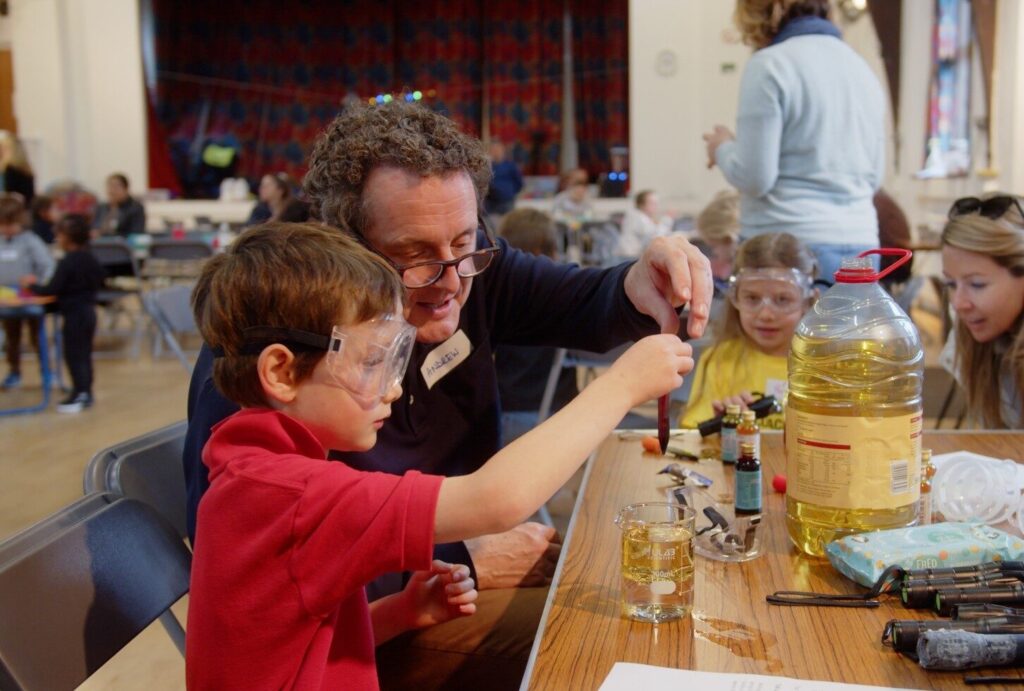How very interesting. And moving. And thought-provoking. Amidst great fear and trepidation, we held our first Messy Communion last night at our Easter Messy Church. We had wondered about doing it as an Agape Meal, this having the advantage that there aren’t any set Anglican rules and also that everyone would be ‘allowed’ to have the bread and wine. But in the end we held out for Communion on the grounds that we don’t mess around with the Sunday congregation giving them what in churchy terms could be seen as second best, so why should the Thursday congregation miss out?
We had to fit the celebration into our normal 15 minutes between craft and tea, which takes some doing if you’re Anglican. We therefore did as much as we could of the service during the craft time: the Bible stories, the intercessions. And we took as much of the craft as we could into the church with us to be part of our worship.
Here are some of the thoughts it raised for me:
It’s really hard to be both legal (Anglican liturgy-wise) and appropriate for our specific, semi-non-churched congregation. We ruefully had to chop and adapt the liturgy thoughtfully and prayerfully and resign ourselves to bending the rules reverently: we included a preparation, a confession, the shortest possible Eucharistic prayer in the book, a minimum of spoken responses, a thank you and the grace. We didn’t include the creed, the collect, the Lord’s Prayer or some of the required responses. It felt bad, because we are part of the stretching-through-time-and-space Anglican Church with our wider identity in her, but we felt it was appropriate to make sacrifices for the sake of the people who were there. The fact that the vicar (my husband) and I came so near to quarrelling about the wording shows how emotive a subject it is… We would be glad of some official ‘guidelines’ on the liturgy rather than ‘thou shalts’ so that we could feel less criminal as we seek the way ahead for our congregation.
Absolutely brilliant to have (and need) NO written words at all – in our pre-literate congregation, repeating the leader’s words or having a brief explanation, for example ‘Can you join in with “Thank you Lord”‘ made much more sense and felt much more inclusive than putting up illegible (to half our people) words words words on a screen or on paper.
Doing the ‘getting ready’ part of the celebration in the hall before going into church, through a short series of questions and responses, made a very inclusive, enthusiastic ‘this is what we’re about to do together’ start and made it very clear what was going to happen.
And how fascinating the atmosphere when the vicar said, ‘Now get hold of someone’s hand – someone in your family or a friend. We don’t want anyone to go into church on their own.’ Some embarrassment, because after all, we are British, but some holy bewilderment that it should matter to the church whether someone felt lonely or not.
We sang as we went into church: this fizzled out a bit – might have been better to have started a CD to keep everyone singing together till we’d all arrived.
It felt very ‘right’ to stand around the table in a (somewhat messy) circle for the whole celebration. From where I was standing, it looked like the feeding of the 5000 on the hillside. A 13-year-old said afterwards that it was really good, standing like that. Next time we need easy-going stewards to help people form a better circle; I should have remembered from Barnabas RE Days in schools that making a circle with 60 people isn’t as easy as it sounds.
It was perfect to have the prayers (written on leaves and hung on a tree) brought in by one of the mums and placed on the table with a cup and a plate also made during the craft time. We had brought our prayers through from the exuberance of the craft time into the stillness of the celebration time and that somehow gave these prayers more dignity. We should have had our home-baked bread as well, but we hadn’t got round to baking the plaited scone-dough loaves, so we used the vicar’s emergency white sliced.
We took the line, ‘If you’re confirmed or have Communion in your own church, please have the bread and the wine; if you aren’t yet confirmed, please have a blessing.’ A few of the children tried for the bread but admitted bashfully that they didn’t usually have it and seemed happy with a blessing. It was very equalizing: some of the adults took bread and wine; some didn’t; some of the children did and some didn’t. Some knelt and some stood. (One did cartwheels down the nave and two had a tag game until they were drawn in for their blessing.) A 15-year-old boy whispered to me afterwards that his eyes had filled up. ‘What’s a blessing?’ demanded one of the tag-playing five-year-olds. ‘When I sneeze, you say, “Bless you!”‘ Makes you realize how far back you need to start. This might be the first time some of these people have been blessed individually. ‘Blessing’ would actually make a great theme for a Messy Church.
At tea, the children I was sitting with were full of questions, mostly wanting to know how / when they, too, could have the bread and the wine. Of course I accept that this might be just because of the ‘naughtiness’ of drinking wine. I explained that we need to get our church to change some of the rules, then we could all learn about the meal and then everyone who wanted it would be able to have it. It would be a very effective step towards discipleship: a gentle, messy, short course learning about Communion for the whole family. If we can get the PCC to pass the ‘Communion before confirmation’ ruling.
What a great evangelistic tool the Eucharist is – and being a rather tepid-in-attitude-towards-the- Eucharistic person myself, I never thought I would be writing those words. The whole ‘drama’ of the experience – the ‘something for everyone’ yet ‘there’s something more waiting for you’ aspect of it has made some of our congregation want more… how exciting.
It’s really interesting to look at the liturgy through our children’s eyes or through a linguist’s eyes. Think about ‘Christ has died; Christ is risen; Christ will come again’: we don’t ever call Jesus ‘Christ’ in Messy Church – he’s ‘Jesus’ to us, so it made sense to change those lines to ‘Jesus has died; Jesus is risen…’ and so on. And we nearly used the Easter greeting: ‘Christ is risen / He is risen indeed, alleluia!’ But if you really think about it, when do we use this terminology ‘He is risen indeed’? We would say, ‘Yes! He is risen!’ or ‘He certainly is!’ or ‘Yes! He’s alive!’ ‘Indeed’ sounds to me (once a linguist by training) like a clunky translation from another language in this context. It’s church-speke, which is all well and good for those who have been brought up in the Church, but it needs to be thought about carefully before it is introduced to people who are just putting a toe inside church and need to articulate faith in a comfortable language as well as becoming aware of the ‘otherness’ and ‘mystery’ of God…
You may also like

Woman at the Well
3rd Nov 2024
Seaside Sojourn
21st Oct 2024It seems that I always get booked to deliver in-person training at seaside locations. This trend continued last weekend, as I headed off to the coastal village of Seaton, Devon.

Our Survey Said…
7th Oct 2024Back in February 2024, Church of England kindly sponsored a survey, completed by 330 Messy Church leaders. This is what we...

Storytelling from within God’s Story.
10th Sep 2024Hi Messy Friends! My name is Andrew McDonough. I live in Australia, draw sheep and tell stories. It began long long ago w...

